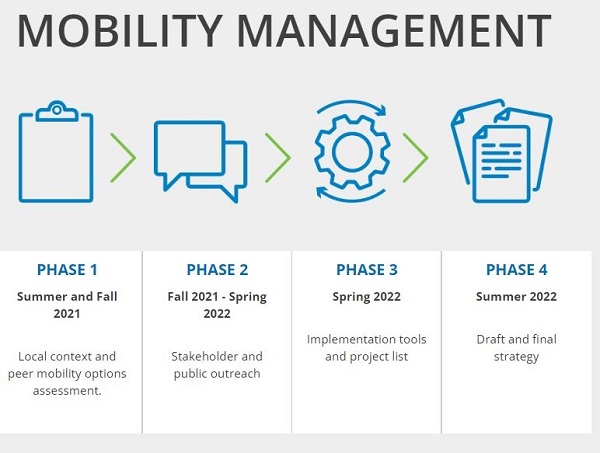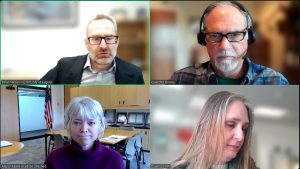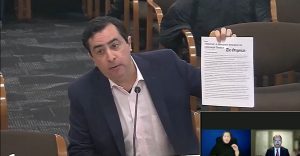LTD to share mobility management framework this summer
6 min read
The Lane Transit District is building its mobility management framework. With the industry-standard definition, LTD planner Andrew Martin.
[00:00:08] Andrew Martin: ‘Mobility management is an approach to designing and delivering transportation services that starts and ends with the customer. It begins with a community vision in which the entire transportation network works together with customers, planners, and stakeholders, to deliver the transportation options that best meet the community’s needs.’
[00:00:25] It really gets at the customer-centric nature of what we’re talking about, and how it’s really up to everyone who puts the transportation system together to figure out how to cooperate and make that trip seamless for our customers.
[00:00:39] John Q: A customer’s trip may include a ride on a 40-foot bus, but getting from their front door to the bus stop may involve other options.
[00:00:46] Andrew Martin: LTD figured out a long time ago how to be really successful at running traditional fixed route bus service. We have one of the best systems in the country by a lot of measures, and I think our community really values it. But there are a lot of other options out there today and some of these are new or they’re re-imagined. So, things like shared e- scooters, shared bicycles, flexible-routed or on-demand in smaller vehicles, and integrated trip planning applications,
[00:01:14] So, a really broad spectrum of things that make it easier for people to get around. And the question that we’re really asking is: What is LTD’s role in all of these different things? And: How can we be successful at making sure that these are implemented in our community?
[00:01:28] John Q: LTD is not only a mobility provider, the agency is also a mobility manager.
[00:01:35] Andrew Martin: Our RideSource Call Center has been around for quite a while. And I think that’s a really good example of how we are already doing mobility management. I think we have 18 or 19 different programs in RideSource Call Center. Many people might be qualified for two or three or four different programs. And rather than put the burden on them to say, ‘Call this number if you qualify for a rural veterans program; call this number if you qualify for ADA paratransit, ‘ LTD does the work to basically say, ‘Okay, you need to get from A to B, you’re qualified under these programs, we’ll figure out the best way to provide that ride.’
[00:02:10] John Q: Andrew said LTD has long supported innovations like bike share, on-demand transit, and a mobility wallet.
[00:02:17] Andrew Martin: We’ve been working with non- traditional modes for a transit agency. So PeaceHealth Rides, LTD did the initial feasibility study that said, ‘Hey, bike share can work at Eugene.’ And then the City of Eugene really took that on. They found capital funding. They found an operator—currently the non-profit Cascadia Mobility—and we are still to this day, part of a group of people who partner on that.
[00:02:43] We’ve also been experimenting with flexible-routed and on-demand service. So we had our EmGo in downtown Eugene, and our LTD Connector Service in Cottage Grove, which is still operating today. We’ve been experimenting with pilot projects as a way to really see, how does LTD use these new tools to connect our community?
[00:03:03] And it’s really about figuring out what we’re good at, what we’re not good at, and where we need partners and where we need help. And then we’re working to operationalize that into a framework that helps us to say, well, if we know that there’s a gap in the community, and we’re using the public outreach to identify some of those gaps, get ideas from the community, and we’re going to run them through the framework, and kind of see, if someone had grants, what could we be working on? And who would we need to help us do some of those things? Because we know we can’t do everything, or we can’t do everything well.
[00:03:31] We’re also working on an implementation guide for running pilot (projects), because that’s something that’s fairly new to transit agencies. So how can we be really successful at running pilots?
[00:03:39] And this summer we’re going to publish our strategy, that decision-making framework that will help us to really focus on how we can implement new tools to move our community.
[00:03:48] John Q: The mobility wallet project involves the University and the City of Eugene Parking.
[00:03:54] Andrew Martin: The mobility wallet came about around the same time as we were getting started with the mobility management strategy. That’s a partnership between LTD, the City of Eugene—including the Parking folks, which is fairly unique for these types of projects—the University of Oregon, and we hope to wrap in some other partners, once we get it going,
[00:04:14] LTD was able to secure funding to start developing or procure an application which will serve as a multimodal trip planner for the community. And so we want to integrate all of the micromobility devices that are coming to town.
[00:04:28] It might tell you that you can take the bus down River Road, get off in downtown Eugene and take a bike share over to some business you want to visit.
[00:04:38] The City of Eugene is talking about e-scooter. And what’s unique is we’re actually wrapping in the parking and our goal is to eventually let them pay for all of these in one application. And we’re letting people see what all your options are: ‘Well, this is the greenest and this is the cheapest and this is the fastest,’ right.
[00:04:51] John Q: Chris Watchie is public engagement lead for the project.
[00:04:55] Chris Watchie: Andrew, can I ask a quick question? Just about what’s the strategy isn’t.
[00:05:00] Andrew Martin: One of our most frequently asked questions is: ‘ So is LTD thinking about taking away my bus route in my neighborhood and replacing it with something else?’ And the answer is: No. We are not using this process to say, ‘This bus route doesn’t work well, we’re going to replace it with microtransit,’ or something like that.
[00:05:19] What this is really about is LTD figuring out how we can use these tools effectively. And obviously LTD runs a lot of 40-foot buses and 60-foot buses. But if your streets are too narrow, but there really needs to be transit service there in some kind, and we can’t run a big bus, how do we make it work to run something else?
[00:05:38] Who has funding for that? How do we put the funding together? What type of service is it? Who needs to be operating that, who’s at the table making it work? That’s really the kind of questions we’re asking.
[00:05:49] Chris Watchie: What came out of the focus group is, would LTD change their name to a transportation district versus a transit district with this mobility management strategy, that question came up.
[00:06:02] Andrew Martin: I think it’s an interesting question: What is transit? I actually think that bike share is transit— these things are publicly available, they help move people around. And that’s why LTD has, I think, gotten to a place where we say: These things are really important in our community and other people are doing things very close to our mission.
[00:06:21] So maybe we’re not the right people to maintain a bike share fleet because we have diesel bus mechanics, we don’t have bike mechanics. But that doesn’t mean we have no role in it, right? We need to make sure people can use bike share, especially to get to the bus and, you know, get off the bus and go to their final destination.
[00:06:40] Chris Watchie: And I’ll just, to add something about it: The timing of the mobility management strategy is perfect. With the new federal funding from the IIJA (Infrastructure Investment and Jobs Act), active transportation has a significant amount of money coming in, to look at what possible opportunities could be there and how to look at those in a way that works well and makes sense for LTD. So whether that’s interoperable bike share programs between Corvallis, Salem, Eugene; vanpooling program expansion, it’s an exciting time.
[00:07:15] Andrew Martin: I hear great ideas every day come out of the community on things that can help them get around. So we’re always looking to do better. Our mission is connecting the community and not everybody’s connected everywhere yet. And so we’re going to continue to work on that.
[00:07:29] John Q: LTD will share its mobility management framework this summer.






